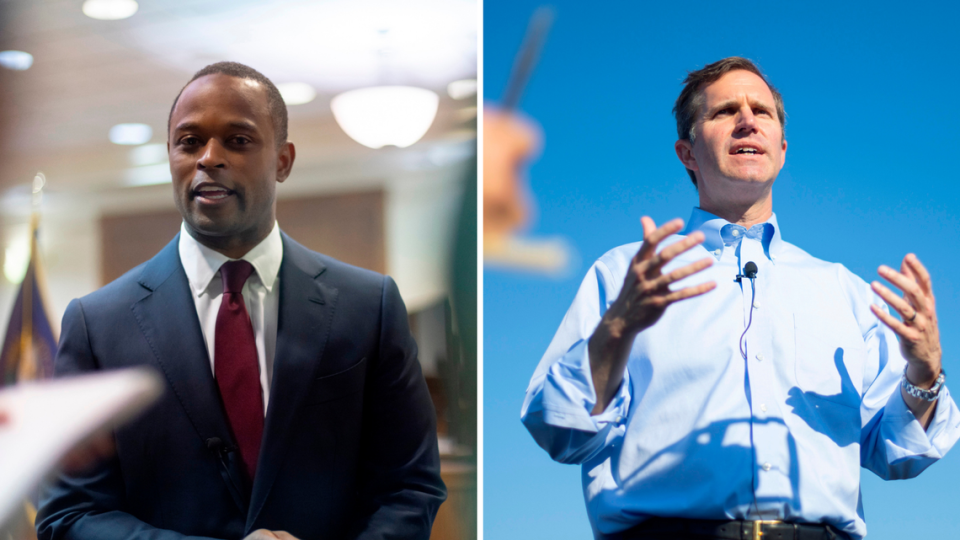Beshear, Cameron debate splitting up JCPS, death penalty and more in Northern Kentucky
It was déjà vu all over again at Northern Kentucky University as Gov. Andy Beshear and Attorney General Daniel Cameron met on the debate stage for the second time this general election season, rehashing some of the same attacks and well-trodden talking points they’d used in Paducah just four days earlier.
The first prime-time debate — and the only in Northern Kentucky — saw the Democratic incumbent and his Republican challenger argue their track records and plans on education, economic development, abortion and more.
And in the next eight days, they’re slated to share the stage an additional three times.
Aside from familiar digs about President Joe Biden and overt partisanship, there were some standout moments.
Here’s a recap of Monday night’s 60-minute back-and-forth.
Should Jefferson County Public Schools be split up?
Some Republican lawmakers have indicated an interest in potentially breaking up the Jefferson County Public School district — Kentucky’s largest — in the upcoming legislative session.
Beshear expressed clear opposition to such a proposition.
School boards are made up of elected members of that community, Beshear said, and what those lawmakers are weighing is “a power-grab” to take away control from “duly-elected representatives in that county.” Doing such would be “devastating.”
“These are some of the same legislators that passed Matt Bevin’s sewer bill and tried to cut the pensions of every teacher, police officer and firefighter,” Beshear said. “They’re the same legislators that have passed unconstitutional legislation that would take dollars out of our public schools and try to send them to private schools.”
School districts were created to be led locally, so “our citizens could ultimately decide how our school systems move forward.”
Cameron, however, was less committal.
Cameron said he’d want to talk to the legislature, school board, superintendent, teachers, parents and other stakeholders before making any such decision.
“Look, I don’t think we need to make a rash judgment or decision,” Cameron said.
“This is the difference between me and Andy Beshear: I believe in getting folks together in a room and having a conversation, folks like Sen. (Christian) McDaniel or (Sen.) John Schickel who are here tonight, other members of the legislature out of Jefferson County, whether they are Republican or Democrat, I want to work alongside them to get to the best answer and solution on this question.
“It serves no one well to make a rash judgment here in this auditorium.”
Beshear touts record of being ‘in the room’
In a back-and-forth over Ford and the United Auto Workers’ strike in Louisville, and balancing worker rights with business interests, Cameron said, “We’re in this mess because of the inflationary pressures that are coming from Washington, D.C.”
And when asked who deserves credit for the BlueOval SK Battery Park coming to Hardin County — bringing with it 5,000 new jobs — Cameron said he applauds “the work of our legislature.”
“On every economic policy that has been of benefit to Kentucky, this governor has stood on the opposite side,” Cameron said.
Driving home a point from Thursday’s debate, Beshear argued that Cameron is “one of the most partisan candidates for governor that we’ve seen.”
“Anything good that happens must be the General Assembly. Anything bad that happens must be the governor,” Beshear retorted. “The answer to how we landed these Ford plants — because I was in the room — was: together. We presented to Ford. We held a special session for Ford. We came together with an agreement about how to get them to pick us.
“The way we bring in jobs in the future is recognize they’re not Democrat or Republican. We’re not team red or blue. We’re just Team Kentucky.”
On guns and the death penalty
When it came to two controversial issues — gun ownership and the death penalty — Beshear staked out positions that might not go over well with some in his own party.
Beshear was unequivocal that firearms used to commit murders should not be auctioned off as state law currently requires, with the proceeds supporting law enforcement. Instead, he said, there should other ways to cover those costs, without adding to the trauma experienced by victims’ loved ones.
As Beshear noted, it’s personal for him. One of his closest friend, Tommy Elliott, was killed during the April mass shooting at Old National Bank in Louisville.
But the governor also noted he “believe(s) in the Second Amendment and that any family or individual should be able to protect themselves.”
Cameron said he supported the destruction of the weapon from the Old National Bank shooting, “but when it comes to the broader and larger picture, I’m going to stand up and support our Second Amendment rights.”
The candidates were also asked about the expansion of the death penalty, which has not been used in Kentucky since 2008.
Cameron’s public safety plan includes passing a bill to mandate pursuing the death penalty for anyone who murders a police officer.
Beshear noted there are “some crimes so terrible and some people so dangerous that I do believe this law needs to continue to be on the books.”
Asked again if he would support expanding the death penalty, Beshear said “it would depend on the crime.”
“But right now,” he added, “a court order is preventing any of those executions.”
Steve Beshear, the current governor’s father, was in office when Marco Allen Chapman was executed in 2008 for fatally stabbing two children in Gallatin County.
“I remember that case, and I remember those kids, that never had an opportunity to grow up in this Commonwealth, to make memories like mine,” Andy Beshear said. “That was a heinous crime, that I believe still deserves this type of penalty.”



